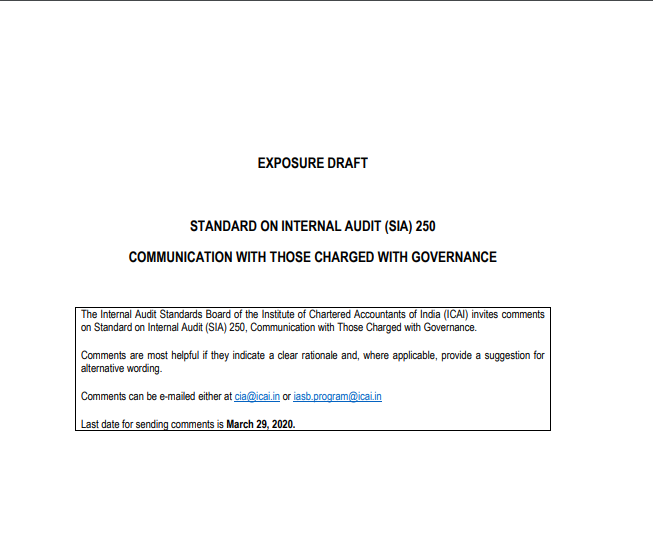STANDARD ON INTERNAL AUDIT (SIA) 250 EXPOSURE DRAFT: ICAI
Table of Contents
STANDARD ON INTERNAL AUDIT (SIA) 250
COMMUNICATION WITH THOSE CHARGED WITH GOVERNANCE
1 Introduction
1.1 Standard on Internal Audit (SIA) 360 “Communication with Management” mandates the need to have effective two-way communication with management for the achievement of internal audit objectives. This Standard covers the need for a similar communication with “those charged with governance” on a periodic basis to ensure the achievement of objectives.
1.2 The term “Those Charged with Governance (TCWG)” refers to either an individual, or a body of individuals, or a separate legal entity with the responsibility for overseeing the strategic direction and accountability of the organization.
1.3 Scope: This standard applies to all the Internal Audit activities including those provided by external service providers.
2 Objectives
2.1 The purpose of this standard is to:
(a) Provide a framework for continuous communication with those charged with governance;
(b) Indicate the need to conduct such communication in a process-driven manner, and
(c) Establish certain essential matters which should be communicated to those charged with governance.
2.2 The overall objective of this Standard on Internal Audit is to emphasize the need for a continuous dialogue and discussion on essential internal audit matters between the Internal Auditor and TCWG in a process-driven manner and to ensure that this communication is independent, definite, effective, and timely.
3 Requirements
3.1 All communication with those charged with governance shall be independent, objective, effective and timely through an established relationship (refer Para 4.1).
3.2 The nature of communication is left to the professional judgments of the Internal Auditor and TCWG. However, a formal communication process, pre-agreed with TCWG, shall be put in place to facilitate effective and timely communication (refer to Para 4.2).
3.3 Certain information considered important for communication is mandated by other Standards on Internal Audit, which shall be included in the list of essential matters for communication. In addition, certain information for communication may be mandated by laws and regulations which shall also be adhered to and included in the list of essential matters for communication (refer Para 4.3).
3.4 During the course of conducting audit assignments, the Internal Auditor may come across certain sensitive information or situations. These may require the attention of TCWG. The Internal Auditor shall discuss such sensitive matters with the Management and agree on a communication protocol of these with TCWG (refer Para 4.4).
4 Explanatory Comments
4.1 Communication Relationship (refer to Para 3.1): The Internal Auditor shall ensure that an effective communication relationship is established and maintained with TCWG. This underscores the criticality of free two-way information flow and the importance of maintaining a continuous professional and independent dialogue with TCWG.
4.2 Nature of Communication (refer Para 3.2): The matters to be communicated, the form and manner, and periodicity of communication are best established between the Internal Auditor and TCWG. In this regard, a formal communication process shall be pre-agreed with TCWG, and include the following (indicative list):
(a) form and content of communication (the “what”);
(b) manner and protocol of communication (the “who” and “how”); and
(c) timelines and periodicity of communication (the “when”).
4.3 Essential Matters of Communication (refer Para 3.2): Certain matters which the Internal Auditor should consider as essential matters for communication may include the following (indicative list):
(a) Annual Internal Audit plan, covering the scope, timing, methodology of audit assignments to be undertaken, along with resources and budgets of the internal audit department;
(b) The outcome of the risk assessment exercise conducted to develop the Internal Audit Plan;
(c) A periodic update on significant observations, with corrective action plans, as agreed with the auditee;
(d) Details of the functioning of the internal audit department and a continuous update on their progress, the status of performance and any resource or budget constraints;
(e) Status update of prior audit issues, their timely closure with an Action Taken Report; and
(f) Any other matters as per Standards on Internal Audit, laws and regulations and the professional judgment of the Internal Auditor.
4.4 Dealing with Sensitive Matter(s) (refer to Para 3.4): At times, the Internal Auditor may come across sensitive information with governance issues (such as management override of controls, possible fraud indicators, etc). Also, sometimes the Internal Auditor may face-sensitive situations where the audit scope is being limited by circumstances such as:
(a) Significant delays by the auditee, either due to unavailability of key personnel or required information;
(b) The unreasonably short time given to complete the audit;
(c) The extensive effort required to obtain sufficient and appropriate audit evidence, and
(d) Restrictions or hurdles imposed on the internal auditor. In such circumstances, the internal auditor shall communicate the concerned sensitive matter(s) with TCWG as per the pre-agreed laid down process and may even choose to issue a disclaimer on the scope of audit as per his professional judgment.
4.5 The Internal Auditor shall maintain all the documentation as required by the Standard on Internal Audit on Documentation. Oral communications with TCWG may be documented for records through written communication or as the minutes of meetings.
5 Effective Date
5.1. This Standard is applicable for internal audits beginning on or after a date to be notified by the Council of the Institute.
Download the copy:
 ConsultEase Administrator
ConsultEase Administrator
Consultant
Faridabad, India
As a Consultease Administrator, I'm responsible for the smooth administration of our portal. Reach out to me in case you need help.








